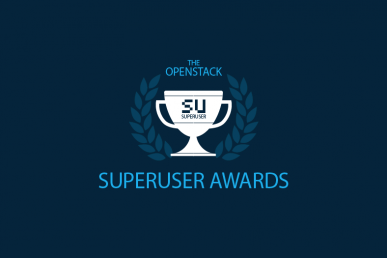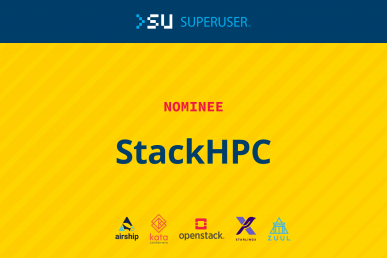Who do you think should win the Superuser Award for the 2020 Open Infrastructure Summit?
When evaluating the nominees for the Superuser Award, take into account the unique nature of use case(s), as well as integrations and applications of open infrastructure by each particular team. Rate the nominees before September 28 at 11:59 p.m. Pacific Daylight Time.
Check out highlights from the eight nominees and click on the links for the full applications:
- Adobe Platform Infrastructure Team ranked 14th among the largest corporate open source contributors (per Github data), in May 2019. They make concerted efforts to free their employees to participate in open source development and streamline the approval process for employees to contribute code. Adobe is committed to open infrastructure and has been actively involved in related communities, including OpenStack since 2013 and Kubernetes since 2019. Adobe IT OpenStack has five clusters spread across three locations in North America and Asia. Of these clusters, three are production. Over the last five years, it grew 1,000% and presently hosts 13,000+ VMs on 500+ physical hypervisors. The underlying Ceph infrastructure of 3.5 PB actively serves 200,000+ IOPS on a regular basis. Besides OpenStack, their Hadoop and Kubernetes implementations grew exponentially in the last few years and now account for thousands of nodes.
- China Mobile Network Cloud Integration Team‘s network cloud includes more than 60,000 physical servers, 1,440,000 cores so far, all based on OpenStack and KVM. These servers are distributed in eight regions across the country and support core network services of more than 800 million users across China. Their self-developed AUTO platform has been used in every region across the country. So far, they have tested 68 resource pools, covering more than 60,000 servers, 11,000 switches, and more than 500,000 network connections in CI/CD manner. The CI/CD pipeline in China Mobile Network Cloud Integration Team‘s lab is based on Jenkins and other open source CI/CD tools. It now supports continuous deployment and test iteration for four vendors, covering test cases of more than 500 each time.
- Leboncoin started using Zuul for open source CI two years ago with Zuulv2 and Jenkins. In the beginning, they only used Gerrit and Jenkins, but as new developers joined Leboncoin each new day, this solution was not enough. After some research and a proof-of-concept, they gave Zuul a try, running between Gerrit and Jenkins. In less than a month (and without official thick documentation) they’ve setup a complete new stack. They ran it for a year before moving to Zuulv3. In terms of compute resources, they currently have 480 cores, 1.3To Ram and 80To in their Ceph clusters available. In terms of jobs, they ran around 60,000 jobs per month which means around 2,500 jobs per day. Jobs average time is less than five minutes.
- LINE uses OpenStack to do 80% of their new instance creation. Their 50,000+ physical servers, including baremetal servers and hypervisors, across four regions and 67,000+ VM instances, give them the capability to reach over 180 million users while decreasing operational costs and decreasing delivery time from weeks to minutes.
- SK Telecom 5GX Labs, on top of contributing upstream to OpenStack and Airship, an open source project supported by OSF, developed a containerized OpenStack on Kubernetes solution called SKT All Container Orchestrator (TACO), based on OpenStack-helm and Airship. TACO is a containerized, declarative, cloud infrastructure lifecycle manager that enables them to provide operators the capability to remotely deploy and manage the entire lifecycle of cloud infrastructure and add-on tools and services by treating all infrastructure like cloud native apps. They deployed it to SKT’s core systems including telco mobile network, IPTV services (5.5 million subscriptions); also for external customers (next generation broadcasting system, VDI, etc). Additionally, the team strongly engaged in community activity in Korea, sharing all of their technologies and experiences to regional communities (OpenStack, Ceph, Kubernetes, etc).
- StackHPC was formed about five years ago, with a vision of the opportunities offered by open infrastructure for scientific and research computing In that time, the team has grown with the growth of open infrastructure, but has remained true to its roots and everything it does is contributed upstream where possible. As such, the company is not just transformed but entirely inspired by open infrastructure. Their next vision is the software-defined supercomputer. They will be building giant machines, among the most powerful computers in the world, designed to solve some of the most challenging problems faced by science today. We will provide scientists and users with new ways of interacting with high-performance computing to help them get straight to the science.
- Trendyol Tech, largest e-commerce company in Turkey, is growing exponentially, and scale growth is driven directly by the Trendyol Tech Team. Using a wide variety of open source technology including OpenStack Keystone, they plan to deploy their third region and increase their total core count to around 50,000 by the end of this year.
- Workday Private Cloud Team has been actively involved in open infrastructure projects by participating in all the open infrastructure summits since the inception of its private cloud team. The team has presented Workday’s stories on scalability, deployment, performance, and operational challenges in the past six OpenStack and Open Infrastructure Summits. Workday engineering recently added support for encryption at rest on Ceph. It contributed to Chef cookbooks used for deploying open infrastructure, submitted bug fixes, and participated in code reviews. Workday has also actively participated in several operators events and meetups. In 2018, Workday organized several open infrastructure meetup events in the East Bay Area. WPC is currently running 43 open infrastructure clusters running across 5 different data centers in the U.S. and Europe. The current number of cores is 422,000. The number of virtual machines running are 30,000 in production. The number of Kubernetes clusters is 70.
Each community member can rate the nominees once by September 28 at 11:59 p.m. Pacific Daylight Time.
Previous winners include Baidu, AT&T, City Network, CERN, China Mobile Network Cloud Integration Team, Comcast, NTT Group, the Tencent TStack Team, and VEXXHOST.
- Demystifying Confidential Containers with a Live Kata Containers Demo - July 13, 2023
- OpenInfra Summit Vancouver Recap: 50 things You Need to Know - June 16, 2023
- Congratulations to the 2023 Superuser Awards Winner: Bloomberg - June 13, 2023

)









